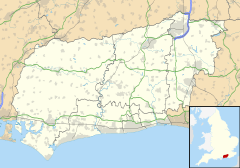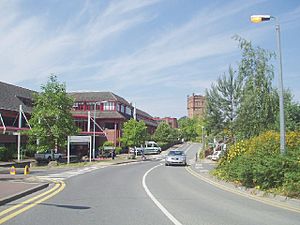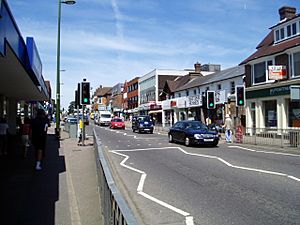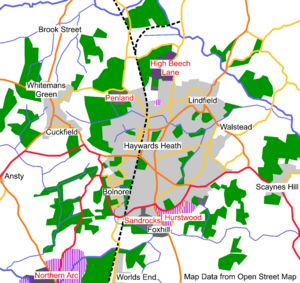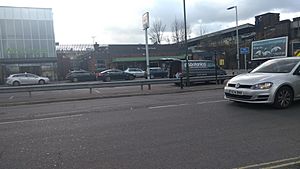Haywards Heath facts for kids
Quick facts for kids Haywards Heath |
|
|---|---|
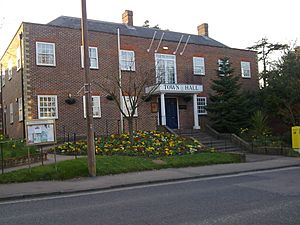 Haywards Heath Town Hall |
|
| Area | 9.75 km2 (3.76 sq mi) |
| Population | 22,800 (2001 Census) 33,845 (2011 Census) |
| • Density | 2,338/km2 (6,060/sq mi) |
| OS grid reference | TQ335245 |
| • London | 34 miles (55 km) N |
| Civil parish |
|
| District |
|
| Shire county | |
| Region | |
| Country | England |
| Sovereign state | United Kingdom |
| Post town | HAYWARDS HEATH |
| Postcode district | RH16, RH17 |
| Dialling code | 01444 |
| Police | Sussex |
| Fire | West Sussex |
| Ambulance | South East Coast |
| EU Parliament | South East England |
| UK Parliament |
|
Haywards Heath (![]() i/ˈheɪwərdz ˈhiːθ/ HAY-wərdz-_-heeth) is a town in West Sussex, England. It is about 36 miles (58 km) south of London and 14 miles (23 km) north of Brighton. The town is also close to Gatwick Airport, which is about 13 miles (21 km) away.
i/ˈheɪwərdz ˈhiːθ/ HAY-wərdz-_-heeth) is a town in West Sussex, England. It is about 36 miles (58 km) south of London and 14 miles (23 km) north of Brighton. The town is also close to Gatwick Airport, which is about 13 miles (21 km) away.
Haywards Heath is a good place for people who travel for work. Many residents commute daily to London, Brighton, or Gatwick Airport. They use either roads or the railway to get to their jobs.
Contents
- Where Did the Name Haywards Heath Come From?
- A Look Back: Haywards Heath History
- How Haywards Heath is Governed
- New Homes and Developments
- Getting Around: Transport Links
- Fun Things to Do and See
- Local News and Media
- Learning in Haywards Heath: Education
- Twin Towns
- Sports and Fun Activities
- Famous People From Haywards Heath
- Images for kids
- See also
Where Did the Name Haywards Heath Come From?
The name Haywards Heath has a long history. It comes from old English words. Hege and worð mean a hedge enclosure. Later, hǣð (heath) was added. So, it means 'heath by the enclosure with a hedge'.
The town's name was first written down in 1261 as Heyworth. Over time, it changed to Hayworthe and then Haywards Hoth. By 1607, it was called Hayworths Hethe. There's also a local story that the name came from a famous highwayman named Jack Hayward.
A Look Back: Haywards Heath History
Haywards Heath has an interesting past. One important event was the Battle of Muster Green. This small battle happened in December 1642 during the First English Civil War. Royalist soldiers fought against Parliamentarian soldiers. The Parliamentarians won after about an hour of fighting.
Haywards Heath used to be part of a larger area called Cuckfield. In 1894, Haywards Heath became its own civil parish. This meant it had its own local government. The town grew a lot after the London & Brighton Railway arrived in 1841. The Haywards Heath railway station opened on July 12, 1841.
Here are some other important moments in the town's history:
- In 1859, the Sussex County Lunatic Asylum opened. This was a hospital for people with mental health conditions.
- Bannister's Cattle Market also opened in 1859. It was once the 12th largest cattle market in the UK.
- Many Victorian and Edwardian villas were built in 1894. These were homes for early commuters.
- The Eliot Cottage Hospital opened in 1906. It was later renamed King Edward VII Eliot Memorial Hospital.
- In the 1930s, Franklands Village was built. This helped families with lower incomes become more independent.
In the 1960s and 1970s, new industrial areas were built. Today, Haywards Heath is a center for many national companies. The town's population has grown a lot. It went from 200 people in the 1850s to 22,800 in 2001.
The main church in town is St Wilfrid's Church, Haywards Heath. There are also other churches like St Paul's Roman Catholic church and the Methodist church. The Priory of Our Lady of Good Counsel was built in 1886. It is a historic building.
Haywards Heath used to be in East Sussex. But in 1974, the county border changed. Now, it is part of West Sussex. The Haywards Heath Town Hall was finished in 1990.
How Haywards Heath is Governed
Haywards Heath has a town council. This council has 16 councillors who make decisions for the town. As of 2023, the Liberal Democrats hold the most seats on the council.
| Political party | Seats held |
|---|---|
| Liberal Democrats | 12 |
| Conservative | 2 |
| Green | 2 |
The current mayor of Haywards Heath is Stéphanie Inglesfield.
Climate Policy
In 2022, the town council supported the Plant Based Treaty campaign. This is a global effort to help with the climate crisis. It's similar to other treaties that aim to reduce fossil fuels.
New Homes and Developments
Haywards Heath has seen a lot of new housing built.
Bolnore Village
A large new area called Bolnore Village was built southwest of the town. Building started in the early 2000s. Over 780 new homes were planned for this area. The first house was finished in 2002. Many different builders worked on the project.
A new primary school, Bolnore Village Primary School, opened in 2010. It was special because it was the country's first school run by parents. Building Bolnore Village was a bit controversial. This was because the area had important natural sites called Ashenground and Catts Woods.
As part of the building plan, a new road was built. This road helps traffic go around the town. It is often called the Haywards Heath by-pass. It rerouted the A272 to the south side of town. The new road opened in August 2014.
Future Housing Plans
Most new housing for Haywards Heath is now on the southern side of the A272. This area is known as Sandrocks. There are six main development areas here. Two of them were finished by summer 2018.
New homes are also being built on the northern side of town. These projects will add about 400 new homes. One started in 2017 near Penland Road. Another started in 2015 between Lindfield and Walstead.
There are also plans to build near Hurstwood Farm. This plan includes a new primary school, a Country Park, and allotments.
Getting Around: Transport Links
Rail Travel
Haywards Heath railway station is a very important station. It is on the Brighton Main Line. Some trains even split here to go to different places. You can catch trains from Haywards Heath to London Victoria, Bedford, Cambridge, Brighton, Eastbourne, and Littlehampton.
Road Travel
The main road serving Haywards Heath is the A272 road. This road now goes around the south side of the town. This new by-pass helps reduce traffic in the town center. The old A272 route through town is now called the B2272.
If you follow the A272 west, it connects to the A23. The A23 is a major road that goes to Brighton in the south and London in the north. The town is also connected to Burgess Hill by other roads like the A273.
Fun Things to Do and See
Haywards Heath has many local features and places to visit:
- Victoria Park
- Dolphin Leisure Centre
- Clair Hall – a community and event center
- Borde Hill Gardens
- Beech Hurst Gardens
- Haywards Heath Recreation Ground
- Haywards Heath Library
- Haywards Heath Cadet Centre
- Princess Royal Hospital
- "Town Day" – a yearly celebration in early September with fireworks at Victoria Park.
Local News and Media
- You can watch local news and TV shows from BBC South East and ITV Meridian (East).
- Local radio stations include BBC Radio Sussex (104.5 FM) and Heart South (102.4 FM).
- The town's local newspapers are the Mid Sussex Times and The Sussex Newspaper.
Learning in Haywards Heath: Education
State Schools
Oathall Community College is a secondary school for students in the town and nearby areas. It even has a school farm! Another secondary school nearby is Warden Park Secondary Academy in Cuckfield. It teaches about 1500 students from Haywards Heath and other villages.
Haywards Heath also has several primary schools. These include St Joseph's Catholic Primary School, St Wilfrid's, Harlands Primary School, and Bolnore Village Primary School.
In September 2020, a new college campus opened. It's called Haywards Heath College. It uses the old Central Sussex College campus building.
Private Schools
There are also several private schools near Haywards Heath:
- Great Walstead School
- Ardingly College
- Hurstpierpoint College
- Burgess Hill School For Girls
- Worth School
- Cumnor House
Twin Towns
Haywards Heath is twinned with two towns in other countries. This means they have a special friendship and cultural exchange.
- Bondues, France
- Traunstein, Germany
To celebrate the link with Traunstein, a section of the A272 road is named Traunstein Way. There is also a German postbox outside the Town Hall.
Sports and Fun Activities
Haywards Heath has a few sports teams:
- Two Non-League football clubs: Haywards Heath Town F.C. and St Francis Rangers F.C..
- A rugby union team.
- Two hockey clubs: St Francis Hockey Club and Mid Sussex Hockey Club. They play their games at The Triangle leisure center.
The Dolphin Leisure Centre is also in Haywards Heath. It has a swimming pool, sports halls, a gym, and a park.
Famous People From Haywards Heath
Many well-known people have connections to Haywards Heath:
- Natasha Bedingfield, singer/songwriter
- Daniel Bedingfield, singer/songwriter
- Tamzin Merchant, actress
- Sophie Cookson, actress
- Richard Osman, TV presenter, went to Warden Park School
- Brett Anderson, singer/songwriter for the band Suede, lived in Lindfield and went to Oathall School
- Mat Osman, bassist for Suede, also went to Oathall School
- Greta Scacchi, actress, went to Haywards Heath Grammar School
- Kaya Scodelario, actress
- Kieran Sadlier, professional footballer.
Images for kids
See also
 In Spanish: Haywards Heath para niños
In Spanish: Haywards Heath para niños
 | William Lucy |
 | Charles Hayes |
 | Cleveland Robinson |


